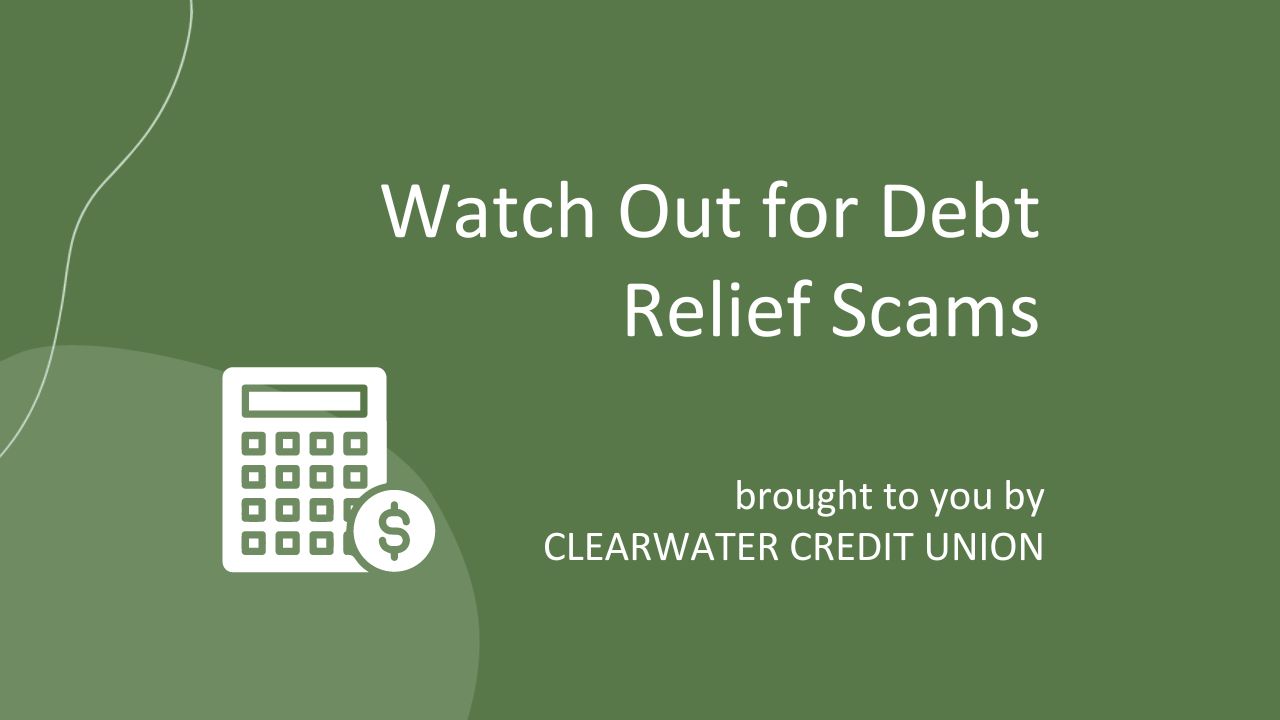WATCH OUT FOR DEBT RELIEF SCAMS
Watch Out for Debt Relief Scams
Debt relief refers to actions taken to reduce or refinance debt to make it easier and quicker for you to repay it. One form of debt relief is to withhold creditor payments while a debt relief company negotiates on your behalf to reduce your overall payments. In this situation, what you owe overall may be reduced, but late or missed payments could damage your credit and lower your score. Debt relief may be the right answer for you, but not all debt relief organizations have good intentions. It’s smart to be aware of the scams out there and know how to spot them.
What are debt relief scams?
Debt relief scams target consumers who have significant debt by falsely promising that they will help you negotiate with creditors to lower your debt owed. These operations often charge large, up-front fees, and then fail to help you settle or lower your debts – if they provide any service at all. Debt relief scams may even masquerade as special “government” programs, but they are only after one thing…to profit from your vulnerability.
What are some common debt relief scam red flags?
- Robocalls. Robocalls (recorded phone messages) are always “watch out” situations. This is especially true when it comes to unsolicited debt relief services.
- Upfront payments. Legitimate debt settlement companies should not ask for up-front payments.
- Tells you to stop communicating with your creditors. When you cut off communication with a collection company, their only other recourse is to take you to court and get a judgement on the debt. If they win the case, then your debt will increase and be automatically taken out of your paycheck or bank account. Keep communicating with the collection company. You want to know what they are doing with your debt.
- Guarantee of results. Be wary of guaranteed results, such as achieving a specific credit score, promising to get results, or stopping debt collector Results are never guaranteed.
- Leaning into “government programs” or other legal-sounding terms. Scammers will do anything to sound more legitimate, including claiming government affiliation. Though they may cite government programs or legal loopholes, their claims could be false.
- Offers of enrollment without looking at your documents. A legitimate company should take time to look over your situation before agreeing to work with you. If you get an offer for help without having your financial documents reviewed, step on the brakes.
How to avoid being scammed?
- Work directly with your creditors to make payment plans. You do not always need a debt relief company to tackle your debt. Try to work with your creditors directly so you do not open yourself up to possible fraud.
- Choosing a reputable nonprofit credit counselor. Debt management, debt consolidation, and debt relief plans are different things and affect your credit differently. If you need assistance paying off your debt, seek a reputable nonprofit credit counselor. Both Homeword and Clearwater Credit Union can help.
- Not answering unsolicited phone calls or emails. If you did not contact anyone about debt relief, there is no reason to respond. Scammers often use these methods in phishing attempts.
Just remember, if it sounds too good to be true, it likely is. Stop and do some extra research to protect yourself from being scammed.
Sign up for Homeword’s Financial Skill Building class to learn more about how to protect your finances.







